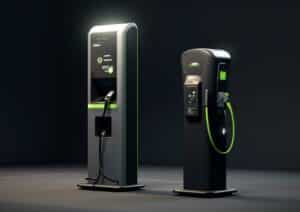As the world continues to shift towards electric vehicles (EVs), many business owners are starting to consider installing EV charging stations at their commercial locations. By doing so, they can make their business more attractive to customers and demonstrate that they are committed to providing a great experience. However, before investing in an EV charging station, there are several things you should know. This guide aims to provide you with a comprehensive overview of all the costs associated with installing a commercial EV charging station and what it entails.
An Overview of Three Different Types of Electric Vehicle (EV) Chargers for Commercial Use: Level 1, Level 2 and DC Fast Chargers (DCFCs)
The first step is understanding the different types of EV chargers available for commercial use. There are three main types of chargers: Level 1, Level 2, and DC Fast Chargers (DCFC).
Level 1 chargers have the lowest installation cost since they only require access to 120 volts of power, making them ideal for residential applications. They also have the slowest charge time and tend to be used for overnight charging at home. Installing a Level 1 charger does not require hiring an electrician and is as simple as plugging it into an outlet.
Level 2 chargers require 240-volts and are able to charge EVs faster than Level 1 chargers—they typically take between 4-10 hours for most models. This type of charger requires more installation costs due to its higher voltage requirements, but it’s still relatively affordable compared to DCFCs.
Finally, DC Fast Chargers (DCFC) offer the fastest possible rate of charge among all three types of EV chargers—they usually take between 30 minutes and an hour to fully charge an electric vehicle. These chargers require high power capabilities that can stretch into thousands of dollars in installation costs because they need dedicated circuits installed directly from your building’s electrical panel.
Consider All Costs When Installing a Commercial EV Charger at Your Location, Including Maintenance Fees & Additional Equipment
In addition to installation costs, there are other expenses associated with having an EV charger on-site such as maintenance expenses or additional equipment like signage or cable management systems that may be required depending on local regulations or building codes. It’s important to factor these additional costs into your budget when considering whether or not you should install a commercial EV charger at your location.
The cost of installing a commercial electric vehicle (EV) charger can vary significantly depending on the situation and environment. The type of business, the size of the facility, and the number of charging stations to be installed all affect the price tag. Generally, companies should expect to pay anywhere from a few thousand dollars up to tens of thousands for a complete installation. This cost typically includes materials, labor, permits, and inspections.
When considering the type of business, larger commercial operations like shopping malls or office complexes may require more expensive installations due to the greater number of charging stations needed and specific wiring requirements within such large facilities. On the other hand, smaller businesses with one or two chargers will be able to save some money on their installation costs.
In addition to materials and labor costs associated with electric vehicle charging station installation, businesses must also consider other related expenses such as permits and inspections which must be carried out by licensed professionals. Permit fees can range widely depending on local laws, but businesses should budget for additional paperwork-related costs when planning an EV charger installation project.
Finally, it is important that businesses carefully research their options prior to committing to an installer or service provider. Professional installers who have experience installing EV charging stations are going to be your best option. By taking the time up front to explore all available options for electric vehicle charging station installation, businesses can ensure they are getting value for money and the best possible service for their needs.
Factors to Consider Before Installing an Electric Vehicle Charging Station at a Business Location
Installing an electric vehicle charging station at a business location is becoming increasingly popular as a way for businesses to demonstrate their commitment towards sustainability, reduce their carbon footprint, and increase customer satisfaction. However, before investing in one, there are several factors that must be taken into consideration.
The first step is to understand all of the costs associated with installing and operating the charger. This includes installation fees, maintenance fees, and any additional equipment or services that may be necessary in order to meet local regulations or building codes. It’s also important to consider the size of the charger you need, which will depend on your business’s intended use for it. For example, if you plan on having multiple vehicles charging simultaneously then you’ll likely need a larger unit than if you only have one or two cars using it occasionally. Additionally, depending on where you live, you may be subject to local electricity costs depending on how much energy is used during peak times of day.
Once all of this information has been gathered and assessed, it’s time to decide whether or not investing in an EV charger is worth it for your business location. Additionally, depending on your budget constraints there may be financial incentives available from local power companies needing help meeting renewable energy goals or government grants that could help offset some of the upfront costs associated with buying and installing an EV charger at your business location.
Finally, once all these decisions have been made it’s important to properly maintain your charger in order to keep both employees and customers safe while using it. This includes regularly checking cables and wires for damage as well as following manufacturer instructions regarding cleaning methods and safety protocols when using the device itself. Additionally, ensuring access points are securely locked when not in use can help prevent tampering by unauthorized individuals while also decreasing the risk of theft or vandalism occurring at the site itself.
By understanding all aspects involved with installing an electric vehicle charging station businesses can increase customer satisfaction while also doing their part for environmental sustainability. With this guide in hand demonstrating a commitment towards green energy doesn’t have to be complicated but rather something every business can strive for!
Let Tiger Electric Help You Go Green and Get the Best EV Charging Station Solutions for Your Business Needs
Tiger Electric has the experience and knowledge needed to get your EV chargers installed quickly and efficiently while ensuring safety protocols are followed throughout the process. With our help, you can demonstrate a commitment towards green energy without having to worry about the complexity or cost of installation. Let us help you make a positive impact on your community and environment by providing you with the best EV charging station solutions for your business needs.
Contact us today to get started!







